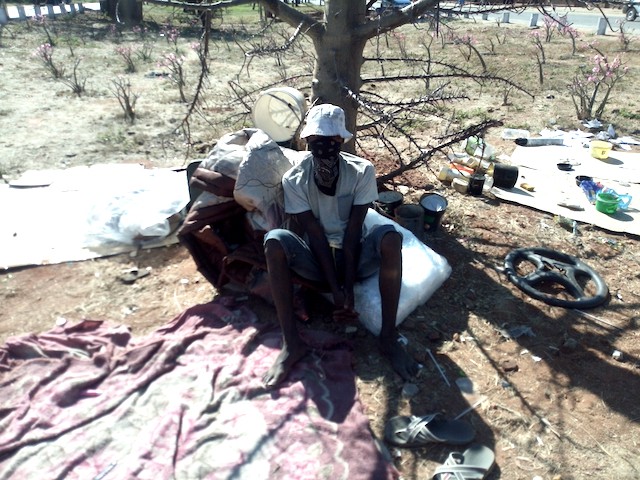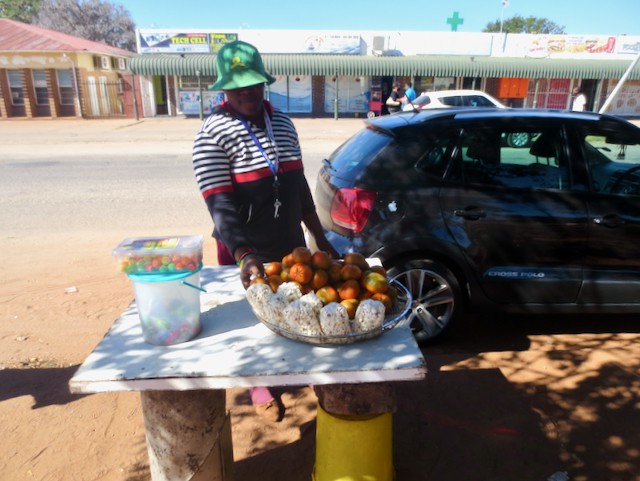Desperate Zimbabweans living on the streets of Musina say municipality makes their hard lives worse
“I thought I had grabbed a way of living … but I now live by scavenging from bins”
Dickson Bwititi’s home consists of a few blankets next to this small tree in Musina, Limpopo. Photo: Bernard Chiguvare
Between the N1 and the Musina Refugee Reception office is an open space dotted with trees. One of these is a small baobab. This is home for Dickson Bwititi. He sleeps here on blankets.
Bwititi, like several people trying to survive on the streets of Musina, told GroundUp that bylaws and municipal police enforcing them make their lives even more difficult. The municipality says there are shelters and they should go there.
Bwititi is 18-years-old and from Rusape in Zimbabwe. He looks frail and dejected. He dropped out of school in grade six after his mother died. He had no siblings and his father remarried. The new family called him “all sorts of words” he says.
“I realised this was no longer home for me, so I decided to leave for South Africa, but did not know exactly where I would end up living,” Bwititi says. He left home with about R550 in his pocket.
For a while he stayed at the Musina taxi rank until he and other people living there were chased away by the taxi drivers.
“At the taxi rank I realised that some street people were earning a living by selling sweets and fruits, so I joined them,” he says. He found a space to sell near Musina post office. But municipal law enforcement kept confiscating his fruit and sweets. Left with no money to buy new stock, he gave up.
“I thought I had grabbed a way of living, but the dream did not come true. I now live by scavenging from bins,” says Bwititi.
If he had money for school fees, he says he would return to Zimbabwe.
Very close to Bwititi’s baobab lives Loveness Moyo. She sells fruits and sweets but lives in constant fear of law enforcement as she operates without a permit and not at a hawker designated site.
Moyo, also from Zimbabwe, says her home fell apart when her family divorced. “At the age of ten, I dropped out of school. No one really could take care of me,” she says.
Her father was blind and she used to assist him going around begging for food. It was with this “skill” she says that she came to South Africa, helping blind people cross the border.
“I really know how difficult it is for blind people to put food on the table in Zimbabwe. I used the same skills assisting the blind travelling to South Africa,” she says.
Between 2010 and 2015, she would find blind people at Beitbridge and help them to beg on the streets of Musina for short stays before returning to Zimbabwe. She would ask them to pay upfront, just in case they got arrested.
Moyo’s parents failed to register her at birth in Zimbabwe. Her mother didn’t have a birth certificate or a Zimbabwean ID either. Now Moyo has three children – aged 2, 14 and 15 – and they are also not registered.
“I wish anyone could assist me to obtain these documents, so that I can also register my children,” she says. She wants to break “the chain of unregistered generations”.
Moyo says it is hard to find employment without any form of identification.
“My aim is to work for myself and my children. If I make some money I would love to go back to live in Zimbabwe. At the moment I cannot go back since no one will take care of me and my children,” she says.
Share With Us As Orphans, a non-profit organisation registered with the Department of Social Development last year, is currently busy recording the people who live on the streets of Musina with a view to feed and help them.
“I have myself gone through this life and I know exactly how it is to live in the streets or to be an orphan,” says Debra Ramunenyiwa, its founder.
Musina municipality spokesperson Wilson Dzebu said, “There are various shelters around Musina assisting homeless people. Most of the people (not all of them) staying on the streets ran away from these shelters because they don’t want to be controlled.”
Dzebu said, “We are working with the Department of Social Development to address the issue.”
“We have bylaws that govern street vendors. We have the right to confiscate their stuff if they disregard the bylaws,” he said.
Loveness Moyo sells fruits, popcorn and sweets. She was not registered at birth and she struggles to find employment.
Next: Artists want Minister Nathi Mthethwa’s head to roll
Previous: Domestic worker’s decade long struggle to make her RDP house liveable
© 2021 GroundUp. This article is licensed under a Creative Commons Attribution-NoDerivatives 4.0 International License.
You may republish this article, so long as you credit the authors and GroundUp, and do not change the text. Please include a link back to the original article.
We put an invisible pixel in the article so that we can count traffic to republishers. All analytics tools are solely on our servers. We do not give our logs to any third party. Logs are deleted after two weeks. We do not use any IP address identifying information except to count regional traffic. We are solely interested in counting hits, not tracking users. If you republish, please do not delete the invisible pixel.




